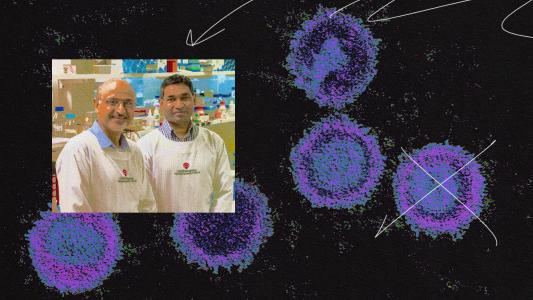The FDA has approved new COVID-19 boosters from Moderna and Pfizer-BioNTech. Here’s what you need to know about the shots — including why you might want to consider getting one.
The details: The FDA has approved the new boosters for people 12 years and older based on evidence from human and animal trials. It has also issued an emergency use authorization that makes them available to people ages 6 months to 11 years.
“These updated vaccines have met the agency’s rigorous scientific standards for safety, effectiveness, and manufacturing quality.”
Peter Marks
Anyone 5 years and up should wait at least two months after any other COVID-19 shot before getting the new booster, and the FDA suggests waiting until 3 months after a COVID-19 infection before getting boosted.
“The public can be assured that these updated vaccines have met the agency’s rigorous scientific standards for safety, effectiveness, and manufacturing quality,” said Peter Marks, director of the FDA’s Center for Biologics Evaluation and Research. “We very much encourage those who are eligible to consider getting vaccinated.”
Several major pharmacy chains, including CVS and Walgreens, are already offering the new COVID-19 boosters — you can use the vaccines.gov website to find an available location near you and make an appointment.
The US government is no longer covering the cost of the shots, so you’ll have to go through your insurance. If you don’t have insurance and don’t want to pay up to $190 out of pocket, you may be able to get the booster for free through a community health center.
Another one? If you’re up-to-date on your COVID-19 vaccines, you may have gotten four shots already, and the idea of getting another one may not be so appealing, especially if you experienced an unpleasant vaccine reaction.
The FDA and CDC expect the side effects from the new COVID-19 boosters to be similar to those from past shots — they have the same dose sizes and the same basic design — so there is a possibility you may end up feeling temporarily less than 100% if you get the booster.
The coronavirus has undergone genetic mutations that make our existing antibodies, from prior shots or infection, less effective.
However, chances are you’d feel worse — and potentially suffer long-term health issues — from infection with COVID-19, and right now, you might not be as protected against the virus as you think.
That’s because the coronavirus has undergone genetic mutations that make our existing antibodies, from prior shots or infection, less effective. Today, some of those mutated versions of the virus are the dominant strains, meaning they’re responsible for the majority of cases.
What’s different? Thankfully, it’s relatively easy to tweak mRNA vaccines, and the new COVID-19 boosters target a recently dominant strain, XBB.1.5, a descendent of the Omicron variant. Studies suggest the boosters are also effective against EG.5 (“Eris”) and BA.2.86 (“Pirola”), two on-the-rise variants that are quickly displacing XBB.1.5.
“The updated vaccines … continue to be the best way to protect yourself against severe disease.”
CDC
Unlike past boosters, which were “bivalent,” meaning they targeted two versions of the virus — the original strain that emerged in late 2019 and a more recent variant — this one is “monovalent,” targeting the new strain only. This is expected to increase their efficacy against the coronaviruses currently circulating.
Even if you do catch COVID-19 after being boosted, though, the CDC says “the updated vaccines … continue to be the best way to protect yourself against severe disease.”
Looking ahead: The current approach to vaccinating against COVID-19 — regular boosters trying to catch up with emerging variants — is the same one we’ve been using for the flu for decades, and the FDA anticipates it being the standard for COVID-19 for the foreseeable future.
Vaccine developers aren’t just waiting around for orders to create the next booster, though.
Early trials of Moderna’s new COVID-19 vaccine suggest it is more effective than the original.
Pfizer-BioNTech are currently conducting phase 1 trials for an mRNA vaccine that targets both COVID-19 and the flu. If approved, that shot could make it easier for people to obtain protection against both respiratory viruses at once.
Moderna has its own combo shot for flu and COVID-19 in phase 1/2 trials and is already in phase 3 trials for a new kind of COVID-19 vaccine that induces immunity by prompting the body to make just two parts of the spike protein, rather than the whole spike like the existing shots.
Early trials in animals and people suggest this vaccine is more effective than the original, even in much smaller doses. It also lasts longer at refrigerated temperatures than the current vaccine, which must be stored and transported at ultra-cold temps. That could make it easier to deploy in rural or less-developed areas, helping ensure everyone is able to stay up-to-date on their COVID-19 vaccines, no matter where they live.
We’d love to hear from you! If you have a comment about this article or if you have a tip for a future Freethink story, please email us at [email protected].






